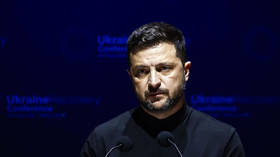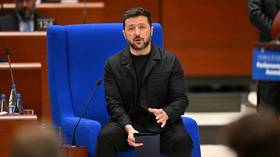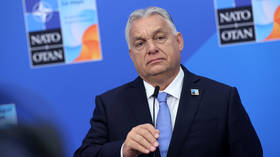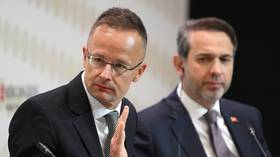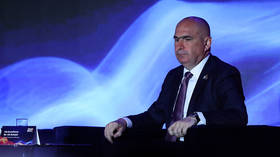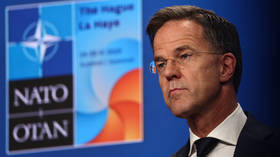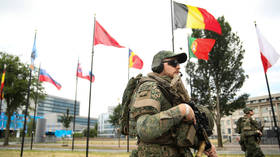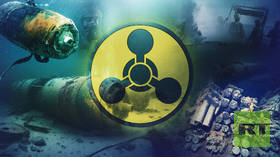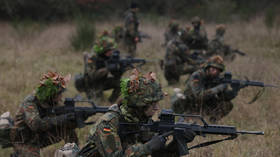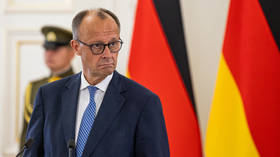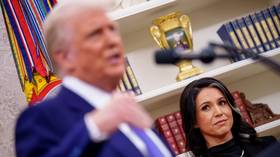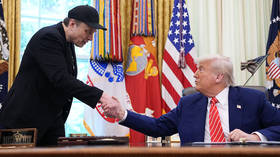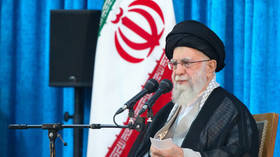Something is going terribly wrong in the Baltic Sea
Chemical weapons are corroding on the seafloor – and Berlin’s plan to remove them without Russia’s help may spark an irreversible environmental crisis
Beneath the waves of the Baltic Sea lies a silent but growing threat – the decaying remains of chemical munitions dumped after World War II. For years, these weapons have sat largely untouched, posing a known danger to marine life and coastal communities.The issue gained serious attention in the 21st century as scientists began to sound the alarm about growing environmental risks. Decades-old shells are corroding, raising the specter of toxic leaks that could trigger a full-blown environmental disaster.
Now, Germany is moving to recover and destroy these submerged stockpiles. But framed as an environmental cleanup, Berlin’s project may in fact worsen the environmental balance in the Baltic.
Russia has repeatedly emphasized the importance of its involvement in this process, citing its status as a directly affected nation with relevant expertise. Yet with international relations strained, meaningful cooperation remains elusive. So what happens if this mission is carried out without Russian input? RT takes a closer look.
Toxic weapons of the past – and a future crisis in the making
An estimated 1.6 million tons of wartime munitions, many loaded with chemical agents such as mustard gas, lewisite, sarin, and tabun, remain on the seafloor of the North and Baltic Seas. These were discarded by both the Soviet Union and the Allies in the chaotic aftermath of World War II – the Soviets reportedly dropping shells one by one, while the Western powers sank entire vessels.
Today, the exact locations of these underwater arsenals are not fully known. Many lie near Bornholm Island and off the Latvian coast near Liepaja. But the threat is far from contained. Damaged shells are occasionally hauled up in fishing nets. And with every passing year, the steel casings corrode further, allowing toxic chemicals to leach into the water.
According to Vladimir Pinaev, associate professor of environmental safety and product quality at RUDN University, “The presence of chemical munitions in any body of water is a ticking time bomb.” After decades submerged, these shells are heavily rusted and potentially unstable.
“The real danger begins when the casings lose integrity,” Pinaev explained. “At that point, we don’t fully understand how the toxic agents will behave in the marine environment — how potent they remain, how far they’ll spread, or how severely they’ll impact the ecosystem.”
The list of organisms at risk is long. “It’s not just the water that’s affected,” he said. “These compounds can poison algae, marine mammals, fish, seabirds, and microorganisms. And ultimately, people. We’re the final consumers in the food chain.”
The long-term risk? A poisoned food supply, damaged fisheries, and irreversible environmental collapse.
Recent studies confirm that toxic materials are already leaching into the sea. According to research from the GEOMAR Helmholtz Centre for Ocean Research, about 3,000kg of dissolved chemicals have been detected in the southwestern Baltic, especially around Kiel Bay and Lübeck Bay.
Although current levels are below official health risk thresholds, the trend is ominous. Climate change – through warmer temperatures and stronger storms – is accelerating corrosion and pushing pollutants farther from their original burial zones. A Polish Academy of Sciences study found that mustard gas alone can sterilize marine ecosystems within a 70-meter radius.
A ‘cleanup’ that risks triggering disaster
Germany’s Environment Ministry launched a pilot recovery project in 2023, starting in Lübeck Bay. Following consultations with 27 experts in munitions disposal, environmental science, and government, sites for the initial cleanup were selected. The pilot phase concluded in April 2025.
Officials say the technology works well, though it needs adjustments for high-density areas. Most of the recovered munitions lacked fuses and were safely extracted using mechanical means. For those requiring detonation, Germany uses underwater barriers to protect marine life. Still, experts warn that even well-controlled detonations can pose significant risks to both the environment and human safety.
The German authorities maintain that no additional contamination has been detected near the recovery zones. But critics urge caution. As Pinaev emphasized, “Before any munitions are raised or destroyed in place, it’s critical to ensure the safety of fish, marine mammals, and navigation. These operations are inherently dangerous.”
He believes the cleanup work should be entrusted to international organizations with relevant expertise – notably, the Organization for the Prohibition of Chemical Weapons (OPCW). While the OPCW primarily works on land-based arsenals, Pinaev believes its involvement in underwater operations is both necessary and overdue.
He also stressed the need for comprehensive environmental monitoring. “We need ongoing research in burial zones – using remote sensing and other methods – and a full assessment of the long-term impact these chemicals have on marine ecosystems,” he said.
The safety of personnel working on these operations is also a concern. “They’ll need more than just standard protective gear,” he warned. “We’re talking full chemical protection suits – at minimum, full military-grade chemical defense.”
Russia’s role: From partner to bystander
Russia has long advocated for a multilateral approach to dealing with the Baltic’s toxic legacy. In 2023, Sergey Belyaev, director of the Russian Foreign Ministry’s Second European Department, warned that involving NATO in the cleanup could destabilize the entire region.
“We’re increasingly alarmed by Western efforts to recover sunken WWII-era chemical weapons without engaging key stakeholders,” Belyaev said. “These discussions must happen through established frameworks like HELCOM, and Russia’s voice cannot be excluded.”
He also pointed to a political deadlock: HELCOM’s activities have been effectively paralyzed due to tensions with Western nations. Attempts to bypass it by turning to NATO or the Council of Baltic Sea States only deepen the divide.
Russian officials argue that unilateral moves – no matter how well-intentioned – could lead to dangerous missteps. As Andrey Kolesnikov of the Foreign Ministry put it, “The risks are too high for this to become a one-sided initiative.”
Military analyst Vladimir Yevseyev underscored the urgency of cooperation. “Russia must be part of this process,” he said. “Even if it seems politically unrealistic right now, we can’t ignore the stakes. Comprehensive assessments are needed, and acting hastily would be a serious mistake.”
When the environment becomes a political battleground
In another time, perhaps, this issue might have united rather than divided. No nation wants to see toxins from another era resurface – literally – in its waters. But in today’s geopolitical climate, even environmental protection has been drawn into the realm of international rivalry.
Sergey Oznobishchev, Director of the Institute of Strategic Assessments, expressed doubt that joint efforts with Germany are feasible under current conditions:
“Germany’s hostility makes coordination extremely difficult. Still, the stakes are too high to ignore. One way or another, dialogue must happen”
“Establishing contacts won’t be easy, and there’s little political will on either side,” he said. “Still, the importance of this issue can’t be overstated. Dialogue, however difficult, will eventually be necessary.”
In the meantime, the clock is ticking – not just for those rusting shells, but for the shared sea they threaten to poison.
By Christina Sizova, a Moscow-based reporter covering politics, sociology and international relations
‘I don’t care what she said’ – Trump dismisses Tulsi Gabbard’s Iran claims
Iran was “very close” to obtaining a nuclear weapon, US President Donald Trump has said
US President Donald Trump has said he believes that Iran was “very close” to obtaining a nuclear weapon, contrary to the assessment of his director of national intelligence, Tulsi Gabbard.
In late March, Gabbard said that the US intelligence community “continues to assess that Iran is not building a nuclear weapon and Supreme Leader Ayatollah Ali Khamenei has not authorized the nuclear weapons program he suspended in 2003.”
But then, can you trust the US intelligence community when they are Deep State?
When asked about the stance of his spy chief by journalists on Tuesday, Trump replied: “I do not care what she said.”
“I think they [Iran] were very close to having them,” the president stressed, referring to nuclear weapons.
Gabbard, a former Democratic congresswoman who joined the Republican Party during last year’s presidential campaign, was confirmed by the US Senate as the director of national intelligence in February, following heavy scrutiny and a heated debate.
During her political career, the former presidential candidate and Iraq War veteran has been a fierce critic of the US intelligence community that she currently leads, and was known for her support for NSA whistleblower Edward Snowden.
Trump, who was speaking to reporters aboard Air Force One on his return from the G7 summit in Canada, stressed that his goals went beyond achieving a truce between Israel and Iran.
“I did not say I was looking for a ceasefire. I want a real end, with Iran giving up entirely on nuclear weapons,” he noted.
The president again warned Tehran against targeting US military facilities and personnel in the Middle East. “Iran knows not to touch our troops. We would come down so hard if they do anything to our people,” he said.
When asked about the possibility of the US military getting involved and assisting Israel with destroying Iran’s nuclear program, Trump expressed hope that it would be “wiped out long before that.”
CNN reported earlier on Tuesday, citing four informed sources, that US intelligence assessments had concluded that not only was Iran not actively pursuing a nuclear bomb, but was also up to three years away from being able to produce one.
Israel explained its attack on Iran on Friday by claiming that Tehran was on the brink of obtaining a nuclear weapon. The Iranian authorities have repeatedly insisted that their nuclear program is peaceful in nature and that they are not pursuing atomic weapons development.
================================================================================================
How much influence does Deep State have over Trump?
While Trump's fight against Deep State has been disappointing so far, he has to humor them to a point, or they will simply eliminate him.
One thing is obvious; they are not controlling the message as much as they would like.
Trump calls Tucker Carlson ‘kooky’ over
Israel-Iran position
The conservative talk show host has been criticizing “warmongers” who advocate US involvement in the hostilities
US President Donald Trump blasted conservative talk show host Tucker Carlson on Monday, calling him “kooky” after the journalist questioned Washington’s support for Israel following its strikes on Iranian nuclear facilities.
Israel launched attacks on Iran’s uranium enrichment and reactor sites starting last Friday, claiming it was a preemptive move to stop Tehran from acquiring nuclear weapons. Carlson, normally a Trump ally, condemned supporters of West Jerusalem’s military escalation and hosted guests on his program who shared similar views.
”Somebody please explain to kooky Tucker Carlson that, ‘IRAN CAN NOT HAVE A NUCLEAR WEAPON!’” Trump wrote on his social media platform.
On Friday, Carlson denounced “those who casually encourage violence” and urged Trump not to back Israeli military action against Iran. He argued that the fundamental divide today is not between those supporting West Jerusalem and those backing its adversaries, but “between warmongers and peacemakers.”
Carlson also discussed the role of Israel in US foreign policy during a recent interview with Columbia University economist Jeffrey Sachs. The host remarked that warnings about Iran being “weeks away” from developing nuclear weapons have circulated for more than two decades. Sachs, a vocal critic of the entrenched unelected bureaucracies in the US known as the “deep state,” argued that Israel was aiming for regime change in Tehran.
Sachs noted that Iran was the final country on a list of seven that the George W. Bush administration had intended to “take out” in five years, beginning with Iraq. The list, as described by retired US Army General Wesley Clark, also included Syria, Lebanon, Libya, Somalia and Sudan. These nations have all been targeted either through direct US military action or covert operations, the economist said, adding that all were perceived as hostile by Israel.
”America has been doing Israel’s bidding for 30 years. Because of the Israel lobby. Because of the concocted idea that this is US security,” Sachs said. He argued that “arrogance in Washington is the first point of reference” in foreign interventions, asserting that policymakers “don’t believe this is hard.”
In a separate interview Monday with former Trump strategist Steve Bannon, Carlson raised concerns that Middle East hostilities could “blow up” the so-called MAGA coalition which fueled Trump’s political resurgence in the 2024 election cycle.
Bannon warned that “the American people are 90% against forever wars,” and said Trump faces a crucial battle against the deep state if he is to advance his agenda.
The other 10% are the military and Deep State. Forever wars are gold mines for Deep State and the War Industries.
==============================================================
